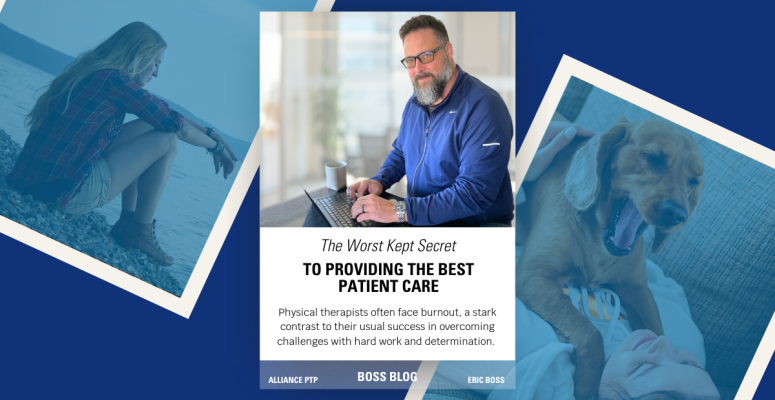
Becoming a Physical Therapist (PT) is a long and demanding road. Excelling academically in undergraduate education is crucial for acceptance to PT school. After that, doctoral-level coursework consumes the next three years. Upon graduation, you must successfully complete a rigorous national exam. Following licensure, many PTs choose to pursue additional specialized certifications or residencies to hone their skills.
Physical Therapists need to bring their "A" game to enter the profession. Despite seven years of preparation, the cycle of sprinting and recovering is eagerly taught and normalized. They power through intense semesters that lead to finals, followed by a brief break. Then, it's back to clinicals, practicals, and another short break. Finally comes the licensure examinations, and just when they think it’s over… the real work begins.
The competitive nature of an academic upbringing never goes away. To stay top of the class, you work harder. Working harder means logging more hours. The reward for this hustle often comes in the form of recognition. This drive is something that PTs, healthcare workers, and those in other non-clinical educations can certainly resonate with.
Unlike school, though, the reward for the effort? Increased responsibility. And more responsibilities bring additional work. It cycles between the intrinsic rewards of accomplishing challenging tasks and the extrinsic benefits of recognition and professional growth. But no one schedules rest for you.
Physical therapists often face burnout, a stark contrast to their usual success in overcoming challenges with hard work and determination. You've always brought your "A" game and excelled academically, where school was a cycle of sprint and rest. Now, work is an ultra-marathon, and the risk of burnout is very real.
To overcome this, we must incorporate refreshing habits into our routines. Rest looks different for everyone—whether it’s meditation, physical activity, or time away from screens. Regardless of the form, it's important to recognize the immense value rest adds. The ideas of rest are abundant and easily searchable. Please explore them.
Rest isn't just a luxury—it's a game-changer for both physical performance and mental acuity. It enhances memory, sharpens critical thinking, and strengthens both emotional control and immune function. Countless studies on rest, relaxation, and sleep build an indisputable case: a well-rested individual outperforms those lacking rest and intentional recovery.
The real question is, why bring less now that you've arrived? You've battled through the rigors of your profession and always brought your “A” game in preparing to be a PT. Your performance inarguably improves when you intentionally take time to refresh and recharge. Schedule breaks into your days, weeks, months, and years. As a professional, resting is just as crucial as studying was when you were a student.
The drive that got you where you are is unlikely to allow incidental breaks to sneak into your schedule. But if you acknowledge that you are better physically and mentally when rested, and if you still have the drive to bring the absolute best care to your patients, you will prioritize some sort of downtime and rest. It's not just that you deserve it. Your patients do, too.
